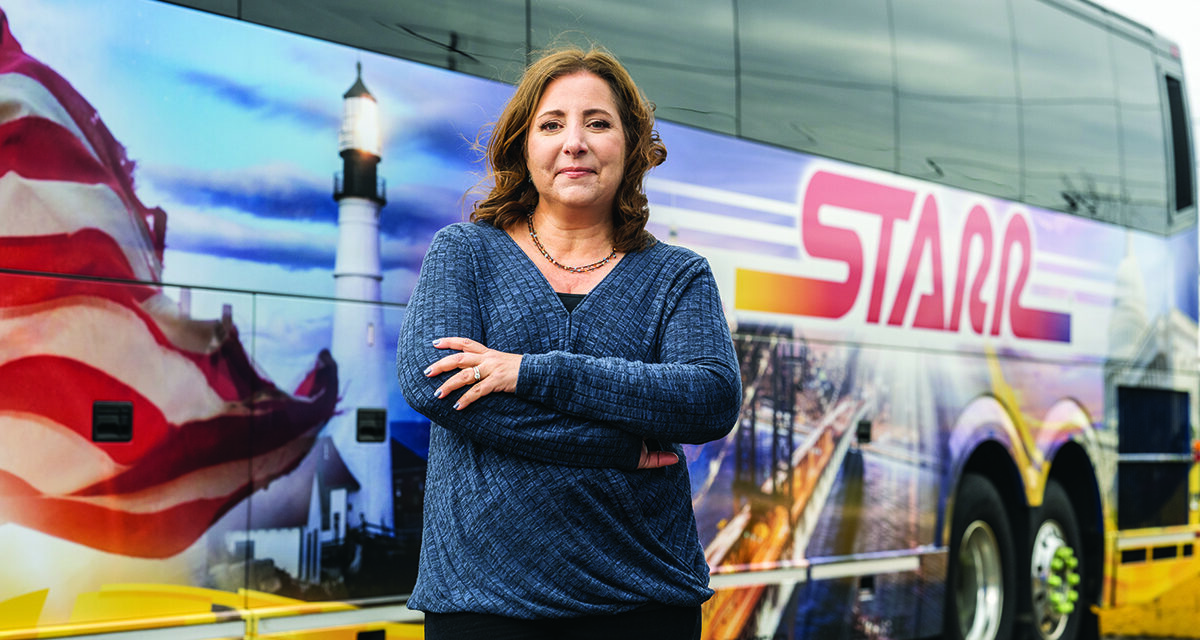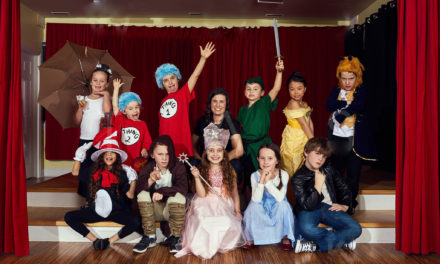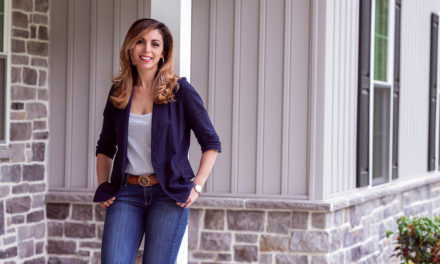As vice president of the family-owned charter and bus tour company, Sandy Borowsky had to drive the business through the global pandemic, when the tourism world was turned on its head.
Sandy Borowsky is not the sort to host herself a pity party. She is a doer—direct and efficient—and if she sees a problem, she doesn’t fret the issue. Instead, she searches for the solution, crowdsourcing for help, considering her options, and ultimately trusting her gut. While those are good qualities to have when the world is dropped into the chaotic mess of a global pandemic, plenty of self-described efficient doers found themselves curled up in the fetal position, unsure what to do or how to move forward.
Sandy easily could have been one of them. She is the vice president of tours and marketing at Starr, a charter and bus touring company that relies entirely on people wanting to travel in large groups, not exactly a demographic suited for a worldwide shutdown. Like every small business in the country, Starr was overwhelmed by COVID-19. The 75-year-old family business idled for months, its buses parked in a lot, stripped of their tags and their insurance policies. With no other choice as they tried to figure out how to keep the capital-heavy business from shuttering for good, Starr had to let go of all but three of its staff members, and for months Sandy and her husband, Pete, the company president, didn’t take a salary.
It was, to say the least, grim. “You work so hard, the blood, sweat, and tears—anyone that’s run a family business knows it’s not always easy,” Sandy says. “So for this to happen, something completely out of our control, to threaten to take away everything we had built, it was just devastating. We had to find a way.”
All of these months later, Sandy can sit at the kitchen table of her Bucks County home knowing that Starr is not only back, but it’s bigger and stronger than it’s ever been. The company expanded its reach, buying the touring division of a Maryland-based bus company that otherwise would have not reopened post-pandemic. Starr also created an entirely new operating line—shuttling local college kids to and from a select list of campuses. Starr’s is the very definition of a pivot, of a company simultaneously ensuring its existence while still somehow planning for its future.
There is plenty of praise to go around—to a husband and business partner who dealt with the financial nuts and bolts to keep the company afloat; to an incredibly loyal staff, who returned to Starr even after their jobs were temporarily terminated; and to an equally devoted customer base who rode out the pandemic, promising to return to travel as soon as the doors were opened.
At the center of it all sits Sandy. It is her family’s business, and she is the hub, connected to all of the spokes on the wheel that kept Starr rolling.
You work so hard—the blood, sweat, and tears. Anyone that’s run a family business knows it’s not always easy. For this to happen, something completely out of our control, to threaten to take away everything we had build, it was just devastating. We had to find a way.
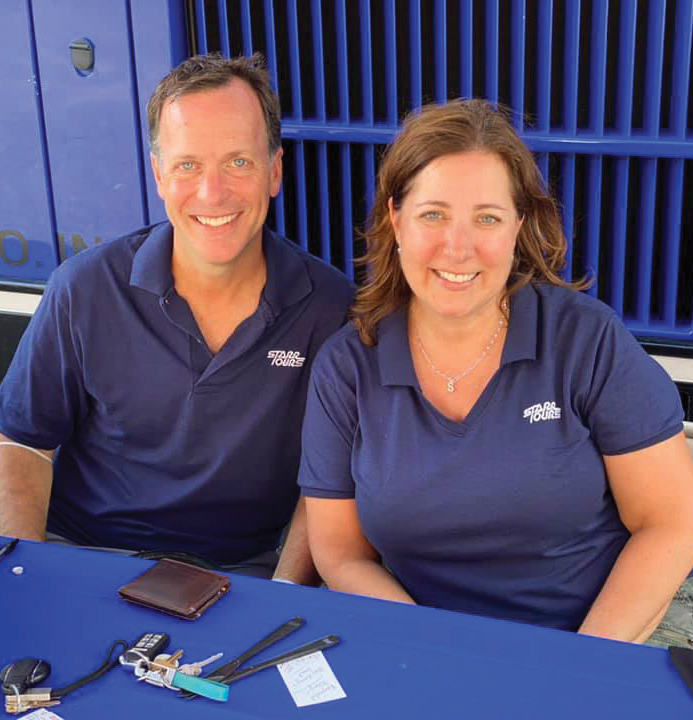
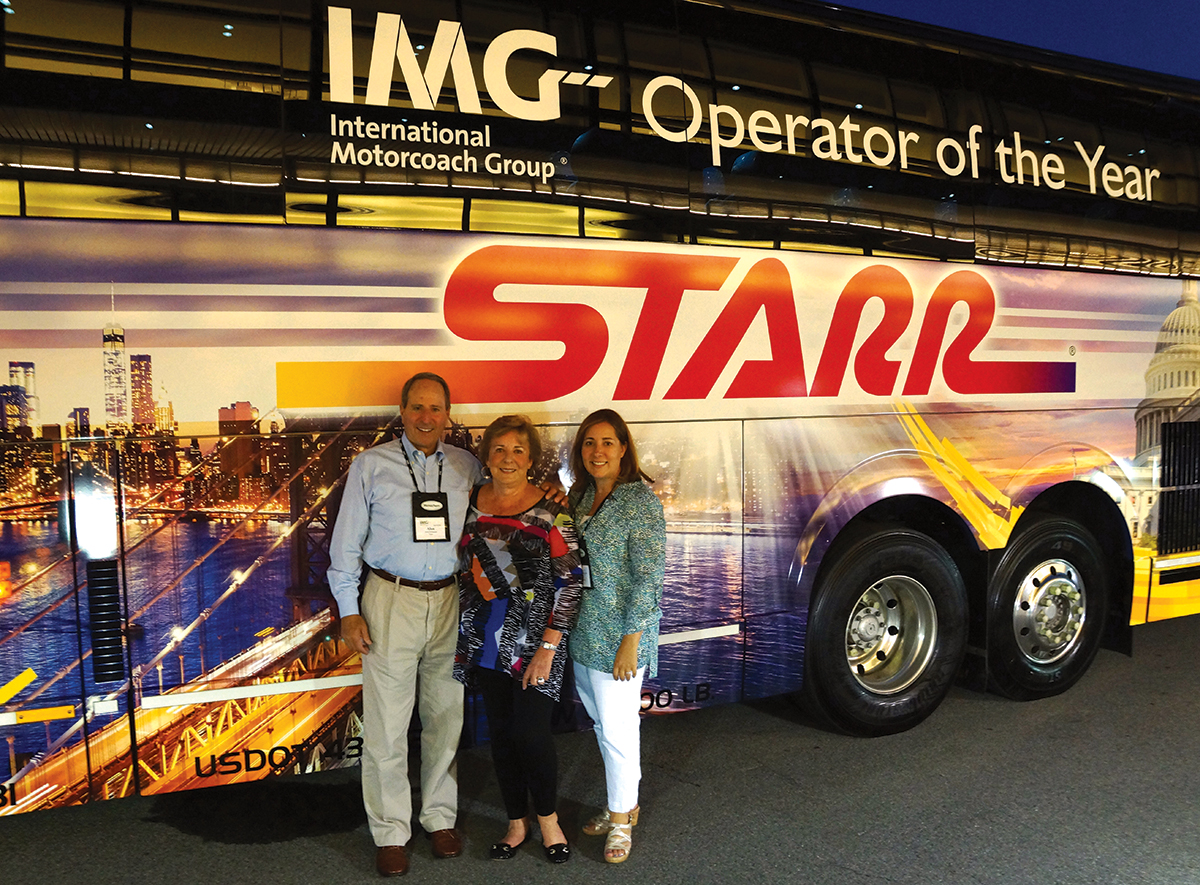
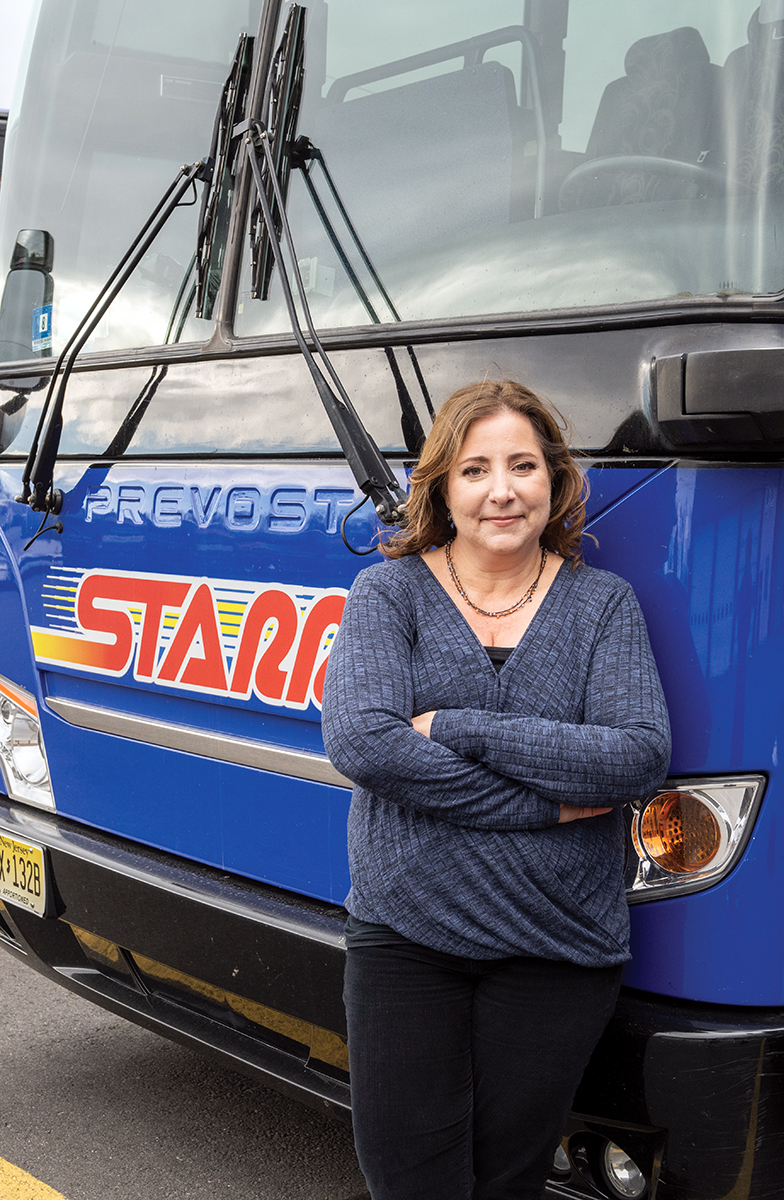
All Aboard
Sandy’s grandfather Gilbert ‘Gil’ Sussman started the Trenton-based business in 1947 with a simple line run to and from Hightstown, NJ, and for years that was the essence of the company, shuttling people from one stop to the next. (Starr is the maiden name of Sussman’s wife.) But in 1964, when New York hosted the World’s Fair, Sussman saw an opportunity and offered people not just a ride from one point to the next but an actual packaged trip. That turned out to be the start of what would grow into a lucrative and nationwide touring and sightseeing venture.
Sussman passed away in 1969—just 2 days after Sandy was born—and his widow, along with his son, Mitchell, and son-in-law Alan Glickman (Sandy’s father) took over the business. Like the company’s founder, they took advantage of good timing. After a few down decades, the Atlantic City casino industry roared to life in the 1980s, with business tycoons opening one gambling house after another. Pitched just 90 miles away, Starr soon regularly began running trips to the Atlantic City playgrounds, offering simple drop-offs and pickups and later overnight stays. The popularity of those trips made growing the geographical reach a logical next step. Starr buses were soon trekking folks to Broadway shows and Lancaster, Pa. and Washington, DC; and eventually every go-to place in the country. From the honky-tonks of Nashville to the bourbon trails of Kentucky, from the lake shores of Mackinac Island in Michigan to the rocky beaches of Cape Cod, Starr covered it all.
Sandy grew up in Washington Crossing, Pa. and although she was aware of the family business, she was not terribly interested. She did, however, like the perks. For one of her childhood birthday parties, Sandy and her best pals climbed aboard a Starr bus for a “mystery bus ride,” and Alan squired the delighted kids away for roller-skating and pizza. Though Sandy worked for the company as a summer job, she had no designs on taking over the Starr helm.
After graduating from Washington University in St. Louis, she took a job as a retail buyer in Missouri, ready to pursue her own career route. When she met her future husband—a Los Angeles native—she transferred the job to the West Coast, confident that she’d found her niche.
But in 1998, Alan and Mitchell needed two big jobs filled, one as a supervisor in the touring division and the other as charter manager. They hired a headhunter, a woman named Francine, to find them a good match. Francine told them she’d found the perfect candidate. “Alan,” she said. “Did you ever think about hiring your daughter?” Alan demurred, certain Sandy was content in California, and not interested in working at Starr. Undeterred, Francine reached out to Sandy, anyway. “I was engaged, and we were looking to purchase our first home, and the prices in Los Angeles were a lot different than back home,” Sandy says. “Luckily my husband had gone to college in the East, so he was amenable to moving back.” Sandy flew home for her bridal shower, but also for a formal interview and wound up landing the charter manager job. “My dad paid the headhunter, too,” Sandy says with a chuckle.
Ten years and three kids later, Sandy switched into the tour division, slowly building a team of 22 tour directors and 15 office staff that suited her style. “The mentality, as it is with a lot of family-owned businesses, is keep things the same,” she says. “But I spent 7 years at this other company, which had a lot of red tape and hierarchy, and I didn’t want that. So I built a staff where everyone works hard all the time, but there’s no watercooler talk. We all support each other, and we work with one purpose in mind: the betterment of the company.”
In a lot of ways, Sandy is like an air traffic controller, managing the tours that are out and ensuring that they all run smoothly. She is on call 24/7, available to put out fires or answer questions for her tour directors. In 2019, Starr enjoyed one of its best years, logging 450 tours, with some 17,000 travelers entrusting their vacations to Starr. As 2020 dawned, Starr was well on the way to matching or bettering it.
And then COVID happened.
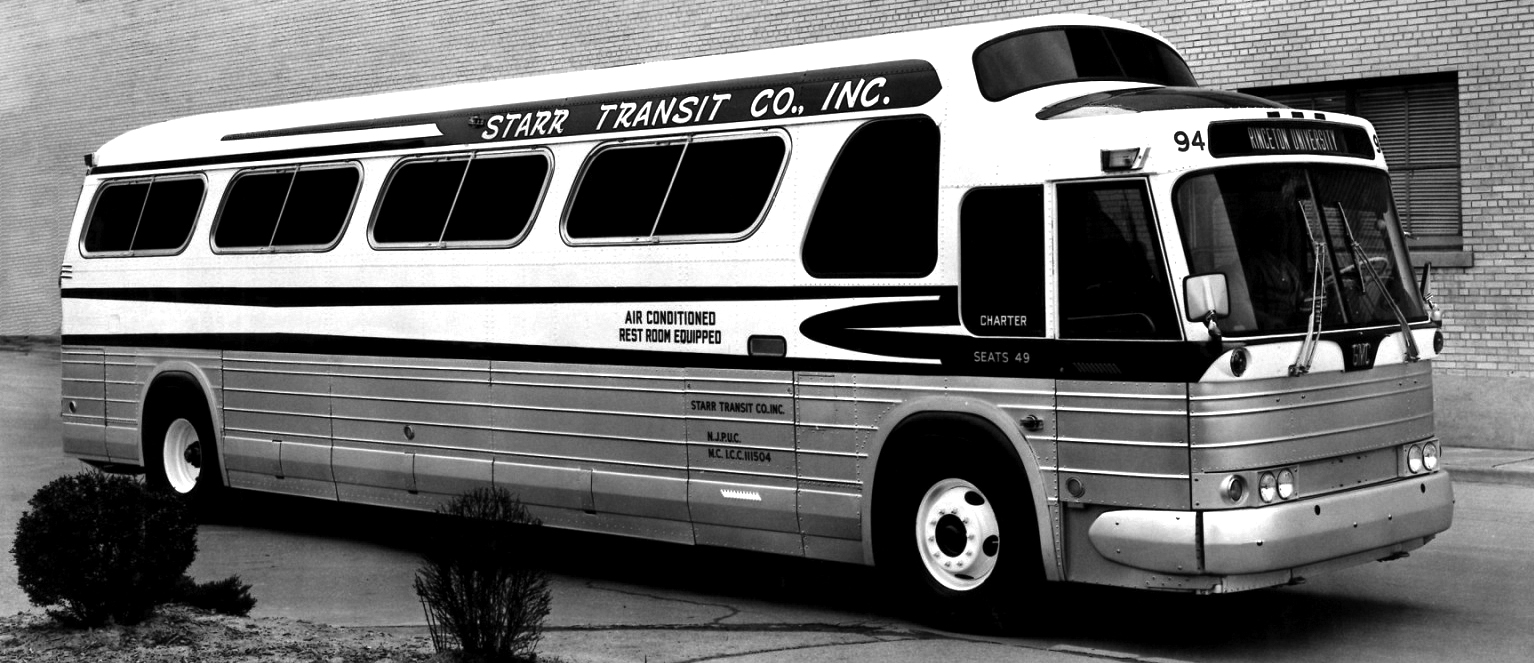
Navigating the Pandemic
In early 2020, during a tour in Florida, the world collapsed like a row of dominoes. The goal at the time was simple: Get everyone home safely. Starr did that, but when that bus full of travelers returned, Sandy and her management team faced the impossible question: What now? “We were shut down…like we took the plants out of the office because we knew we wouldn’t be back to water them.
“Like everyone else at the time, we thought, OK, we’ll be back in a few weeks,” Sandy says. “It ended up being 5 months.” Broken-hearted, Pete and Sandy laid off tour directors, drivers, mechanics, and office staff who felt more like family than coworkers. With Pete now working as president, they essentially had all their financial eggs in one basket, and though Sandy was concerned for her own family, she also carried the weight of so many others on her shoulders. “I knew I would find another job if I had to,” she says. “What ate at me was that I had to take away my staff’s livelihoods, people who had been incredibly loyal to us. It was just overwhelming.”
Pete worked with the banks, accountants, and lawyers to postpone the loans coming due for the buses. They parked their fleet of 40 buses, taking off the tags and canceling the insurance. “Basically, we went down to zero,” Sandy says. Every planned tour had to be canceled, but with no income coming in, how could they issue refunds? Sandy simply told her customers the truth, laying out the company’s financial hardships and asking if they could take a partial refund or perhaps bank the money for a future trip?
Turns out Starr’s star treatment across all those years wasn’t lost on the loyal travelers. “Our customers were amazing,” she says. “They’d say, ‘Keep it on file. When we can travel, I’ll use it then.’ Some of them said, ‘It’s OK. You need the money more than we do.’ It was because of our customers’ patience that we were able to survive and now rebuild.”
Looking to stay engaged with that incredibly loyal customer base, Sandy launched Tour Tuesday during the pandemic. Taking advantage of everyone’s new familiarity with Zoom, Tour Tuesday gives potential customers the opportunity to watch presentations about upcoming tours and ask questions. “We wanted to keep in touch with our customers who had been so good to us,” Sandy says. “We understood, you are not ready to travel yet. But when you are, here are some options.” An average of 100 people tuned in weekly.
The relationship between company and consumer carried Starr for the 5 months it went without a single trip and through the slow crawl back. Though the company had to dip deep into its reserves, the decency of the customers who were willing to wait on their refunds helped ensure that Starr would see its 74th and 75th years.
By late summer, Starr was running quick day trips to the Jersey Shore—carrying masked travelers to safe outdoor spaces, with no overnights. But in August 2020 a nervous Sandy sent her first tour director out for a 7-day trip to Mackinac Island, entrusting Penny Rudolph to guide the
19 travelers through the new normal of a masked tour during a global pandemic. Penny called regularly, reporting that everyone had abided by the mask mandates, and they were having a blast.
While the tour division inched back slowly, Sandy found a reliable resource in another Starr division that she started thanks, at least partially, to her older son, Miles. As he headed off to college, his classmates’ parents often kidded the couple about sending a bus to fetch their kids for the various college breaks. Sandy found herself thinking, Why can’t we? Prior to the 2019 holiday break, Starr launched its college service, collecting Bucks County area kids at Penn State and the University of Pittsburgh. They added a Thanksgiving run in 2020 and eventually added service for Carnegie Mellon, Duquesne, RPI, Syracuse, and West Virginia. “Other bus companies that provided the same service decided not to run during the pandemic,” Sandy says. “So we were able to capture that market.”
Emerging from a near entire shutdown might seem like the absolute worst time to expand a business. Pete saw an opportunity. Eyre Tours, a third-generation family-owned company based in Maryland, was ready to shut down its touring department. Pete suggested Sandy run it from their Trenton office. The family, who were longtime friends, agreed, essentially turning over its tours to Starr. It gave Starr a lot more inventory…and Sandy a lot more work. Along with rebuilding the staff, she now had to familiarize herself with Maryland geography, to figure out pickup and drop-off spots, and oversee another whole group of tours. But she agreed it was good for business and what’s more, “it was a really neat opportunity for us to help another family-owned company.”
Today Eyre Tours powered by Starr operates a full itinerary of one-day trips and multi-day vacations and Starr is back to 80 percent of its trip inventory.
Always on the Bus
The irony is not lost on Sandy. A woman who spends her entire day plotting the perfect vacation for everyone else rarely takes time for herself. She writes all the marketing copy for the company and admits there are days she finds herself salivating over the getaways she’s writing about. She finds her moments on family vacations, day trips to the shore, and the Starr Birthday Bash—this year they’ll visit Louisville and Lexington to celebrate their 75th.
But with two boys in high school and one in college, plus a business to run, Sandy is like a lot of women, just hoping the balls she juggles don’t come crashing on her head. “The one good thing about having the downtime was all of these ideas we’ve had—the college tours, Tour Tuesday, the Eyre acquisition—we could think about how to do it,” Sandy says. “But that means I’ve also got a lot going on.”
She laughs as she says it. After surviving a pandemic that threatened to cripple her 75-year-old family business, having too much to do is a problem she can handle.

